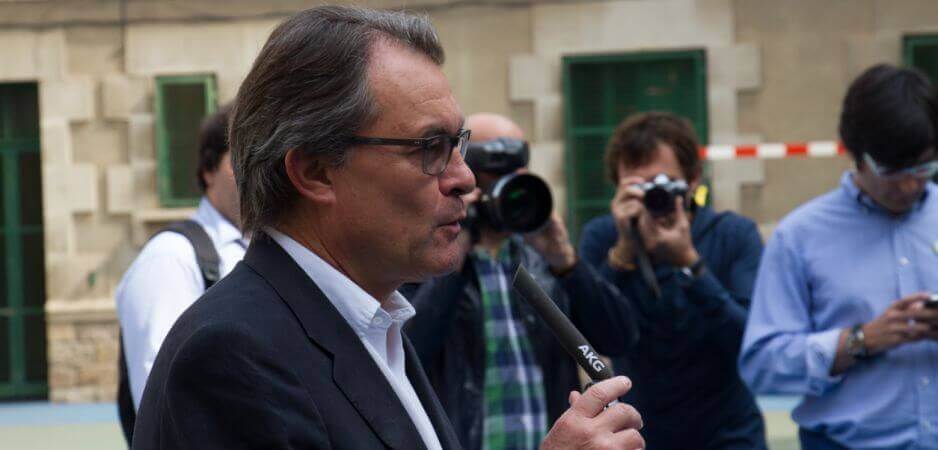The leader of Catalonia’s independence movement deserves a fair trial.
Authoritarian rulers have a crush on parading themselves as the embodiment of the country itself—usually called with the more uplifting name of fatherland—feeling entitled to crush any criticism and dissent as treason and sedition.
An outcome of liberal democracy’s ideological hegemony is that even the more ruthless dictators feel obliged to feign respect for the rule of law to conceal the fact that they just impose the law of the ruler, crushing their opponents by way of rubber-stamp judges applying biased laws. Paying homage to La Rochefoucauld’s motto: “Hypocrisy is the compliment vice pays to virtue.”
The collateral damage of that hypocrisy has been to cast a regrettable shadow of suspicion over laws and judges, even in perfectly fine liberal democracies where it is too easy for political tricksters to cry foul when they are indicted, pretending to be victims of illegitimate laws and government-kowtowing, justice-denying judges.
James Madison rightly remarked: “If men were angels, no government would be necessary. If angels were to govern men, neither external nor internal controls on government would be necessary.” Therefore, our fallen condition cannot totally exclude wicked laws and partial or less-than-independent judges, anywhere and at any time.
I served seven years in the Spanish council of the judiciary, mainly committed to uphold, defend and guarantee the independence of judges against public officials too eager to get the rulings they craved and the judges supine enough to provide them—both in Spain and in other countries as well. It wasn’t always easy, and sometimes it was really rough and nasty, but that’s what checks and balances are for and public duty means.
The usual conflict surrounds free speech, by way of laws and rulings intended to curb it against dissenters and minorities, or politicians denouncing their indictment as a violation thereof. Two liberal democracies come to mind: India and Spain.
THE INDIAN EXAMPLE
India’s current sedition law, established in British Raj times, has often been used against journalists, writers, students, social activists, political foes and those critical of the government. In 2016, India’s Supreme Court asked all authorities to stick to the guidelines laid down by its landmark 1962 ruling Kedar Nath vs. State of Bihar over sedition, summarized by R. Balaji in Kolkata’s The Telegraph:
“Any written or spoken words that have implicit in them the idea of subverting the government by violent means will be punishable.
Strong words used to express disapprobation of government measures, with a view to their improvement or alteration by lawful means, would not come within sedition.
Comments, however strongly worded, expressing disapprobation of the actions of the government without exciting those feelings that generate the inclination to cause public disorder by acts of violence will not be penal.
Disloyalty to the government is not the same thing as commenting in strong terms on the measures or acts of the government or its agencies so as to ameliorate the condition of the people or to secure the cancellation or alteration of those acts or measures by lawful means.
Freedom has to be guarded against becoming a licence for vilification and condemnation of the government established by law in words that incite violence or have the tendency to create public disorder.
A citizen has a right to say or write whatever he likes about the government or its measures, by way of criticism or comment, so long as he does not incite people to violence against the government established by law or with the intention of creating public disorder.”
Nevertheless, the same court has ruled that the Indian national anthem must be played in every cinema before a film is screened. Countless people have been indicted for not standing or somehow disrespecting the anthem, including the writer Kamal C. Chavara, charged with sedition for allegedly showing disrespect to it, and student leader Kanhaiya Kumar, arrested because he and others allegedly shouted anti-India slogans in a rally.
 As far as I know, none of these people have accused the judges of being politically biased against them, and therefore, the conflict will be solved inside the constitutional frame of judges being accepted and respected by all parts involved. It is sedition law, free speech and the constitutional approach to both what’s being discussed.
As far as I know, none of these people have accused the judges of being politically biased against them, and therefore, the conflict will be solved inside the constitutional frame of judges being accepted and respected by all parts involved. It is sedition law, free speech and the constitutional approach to both what’s being discussed.
BIASED JUDGES IN CATALONIA
That’s not, regrettably, what happens today in Catalonia, where judges are regularly vilified as political operators whose strings are pulled by the Spanish government.
This threshold has been momentously trespassed by Catalan politicians, such as councilors, members of parliament (both the Catalan and Spanish ones) and members of the Catalan government, including both its former and current president. Some of them have been indicted for contempt of court because they allegedly failed to obey a court order, in some cases by the constitutional court itself. One councilor was indicted on sedition charges.
Nobody has been indicted over speech supporting Catalonia’s independence, in spite of the flood of propaganda concocted by the Catalan government and its supine media, feigning they are persecuted just because of speech.
The real issue is judges ordering public officials to do or not to do what judges rule as illegal, such as allowing a vote in the Catalan parliament over Catalonia’s independence aims and ways to get it, or organizing an official mock-referendum regardless of the constitutional court prohibition.
The response of those Catalan politicians has taken a populist, illiberal stance upholding people’s will as being paramount above laws and judges—putting themselves as the embodiment of that alleged people’s will and, therefore, above so-called illegitimate laws. It is an astonishing and risky stand that defies the very principles of rule of law and checks and balances, whose slippery slope leads to negate judicial review and denounce judges as mere Spanish government’s stooges.
A former member of the Catalan government, Quico Homs, who is now a lawgiver in Spain’s parliament, declared after being indicted by the supreme court: “This is a political, not a legal judgment. We have the impression that the Spanish institutions have acted arbitrarily and following the will of the Popular Party [Spain’s ruling party]. When I see the coincident positions of both the prosecution and the judges I see that this is very cooked.”
Catalonia’s former president, Artur Mas, said: “I’m absolutely convinced that both me and the members of Catalan government indicted by the High Court of Justice of Catalonia will be condemned. We will be judged over our ideas and not by disobeying the Constitutional Court. The sentence is pre-established. I do not say it’s already written because it would be ugly to say so, but it is drafted or preformed.”
Forget any pretense of decorum appropriate to high office and position, that should be retained come what may. The gloves are off in Catalonia.
EXTRADITION AS DUE PROCESS OF LAW
It would be preposterous to decide right away if these gnarly accusations against judges are really founded or are mere rants by politicians willing to divert attention away from their misdemeanors.
Here is a way to find out: If Mas really means what he says, if the Spanish judges are puppets whose strings are pulled by the government, the right thing for him to do—in order to get an impartial judge solely committed to the due process of law—is to leave the country and wait calmly in France or the United Kingdom for an extradition or mutual assistance request.
Both French and British judges are off-limits, so the Spanish government has no way whatsoever of any pulling strings. Therefore, they can deliver to Mas and the other indicted officials the due process and impartial verdict any person is entitled to.
If the current and coming indicted officials, especially Mas, win the case, it is up to them to choose exile or return to Catalonia and be judged, strengthened by an extradition order denied as politically motivated—with all the sympathy and support this outcome would generate worldwide on behalf of them, Mas and Catalonia’s plight.
*[A shorter version of this article was originally published by Business Insider.]
The views expressed in this article are the author’s own and do not necessarily reflect Fair Observer’s editorial policy.
Photo Credit: Marco Zouvek
Support Fair Observer
We rely on your support for our independence, diversity and quality.
For more than 10 years, Fair Observer has been free, fair and independent. No billionaire owns us, no advertisers control us. We are a reader-supported nonprofit. Unlike many other publications, we keep our content free for readers regardless of where they live or whether they can afford to pay. We have no paywalls and no ads.
In the post-truth era of fake news, echo chambers and filter bubbles, we publish a plurality of perspectives from around the world. Anyone can publish with us, but everyone goes through a rigorous editorial process. So, you get fact-checked, well-reasoned content instead of noise.
We publish 2,500+ voices from 90+ countries. We also conduct education and training programs
on subjects ranging from digital media and journalism to writing and critical thinking. This
doesn’t come cheap. Servers, editors, trainers and web developers cost
money.
Please consider supporting us on a regular basis as a recurring donor or a
sustaining member.
Will you support FO’s journalism?
We rely on your support for our independence, diversity and quality.





